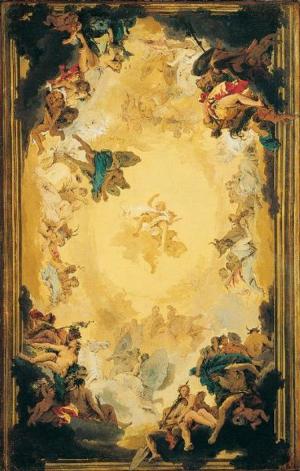A New Witness for God (Complete)
Nonfiction, Religion & Spirituality, New Age, History, Fiction & Literature| Author: | Brigham Henry Roberts | ISBN: | 9781465629708 |
| Publisher: | Library of Alexandria | Publication: | March 8, 2015 |
| Imprint: | Language: | English |
| Author: | Brigham Henry Roberts |
| ISBN: | 9781465629708 |
| Publisher: | Library of Alexandria |
| Publication: | March 8, 2015 |
| Imprint: | |
| Language: | English |
The very title of this book may give offense. "A New Witness for God!" will exclaim both ministry and laity of Christendom; "are not the Old Witnesses sufficient? Has not their testimony withstood the assaults of unbelievers, atheists and agnostics alike for nineteen centuries? What need have we for a New Witness? Every weapon that hostile criticism could suggest, has been brought to bear against the tower of our faith based on the testimony of the Old Witnesses; and it stands more victorious now than ever, four square to all the winds that blow. The testimony of the Old Witnesses has outlived the ridicule of Voltaire, the solemn sneers of Gibbon, the satire of Bolingbroke, the ribaldry of Paine; just as it will outlive the insidious assaults of the German mythical school, and the rationalistic school of critics, which are now much in vogue. Such the confident boast of orthodox Christians. "Meanwhile, every diocesan conference rings with the wail over 'infidel opinions.' It grows notoriously more and more difficult to get educated men to take any interest in the services or doctrines of the church; literature and the periodical press are becoming either more indifferent, or more hostile to the accepted Christianity year by year; the upper strata of the working class, upon whom the future of that class depends, either stand coldly aloof from all the Christian sects, or throw themselves into secularism. Passionate appeals are made to all sections of Christians, to close their ranks, not against each other, but against the 'skepticism rampant' among the cultivated class and the religious indifference of the democracy." In the face of these facts, notwithstanding the confident boasts of orthodox Christians about the invulnerableness of the testimony of the Old Witnesses, it will be well for us to look a little more closely into the achievements of Christianity, Catholic as well as Protestant, and see if they are as satisfactory when measured by actual results, as they are claimed to be in the fervid rhetoric of the orthodox special pleader. What is distinctly and commonly recognized as the Christian religion, was founded some nineteen centuries ago, by the personal ministry of Jesus Christ, and those whom he chose as Apostles. For about three centuries it had a hard struggle for existence. The persecutions waged against it, first by the Jews, from whose religious faith it may be said to have sprung; and second, from the pagans, then in possession of all secular power, well-nigh overcame it. The "beast" made war upon the saints and "prevailed against them." Then Constantine, the friend of Christianity, succeeded to the imperial throne of Rome, and external persecution ceased. Christian ministers were invited to the court of the emperor and loaded with wealth and honors. Magnificent churches were erected, and the hitherto despised religion became the favorite protege of the imperial government. From a precarious and wretched existence, the Christian church was suddenly raised to a position of magnificence and power. Nor was it long in playing the part of the camel which, being permitted by the kind indulgence of its master to put its head within the tent during a violent storm, next protruded its shoulders, then its whole body, and turning about kicked out its master. So did the Christian ecclesiastical power with the civil power. That is to say, that which was at first granted to the church as a privilege was soon demanded as a right; and what was at first received by grace, was at the last taken by force. On the ruins of pagan Rome, rose papal Rome, and while the latter power did not abolish secular government, it did make it subservient to ecclesiasticism. From the chair of St. Peter, the Roman pontiffs ruled the world absolutely. Kings and emperors obeyed them, and all stood in awe before the throne of the triple-crowned successor of St. Peter.
The very title of this book may give offense. "A New Witness for God!" will exclaim both ministry and laity of Christendom; "are not the Old Witnesses sufficient? Has not their testimony withstood the assaults of unbelievers, atheists and agnostics alike for nineteen centuries? What need have we for a New Witness? Every weapon that hostile criticism could suggest, has been brought to bear against the tower of our faith based on the testimony of the Old Witnesses; and it stands more victorious now than ever, four square to all the winds that blow. The testimony of the Old Witnesses has outlived the ridicule of Voltaire, the solemn sneers of Gibbon, the satire of Bolingbroke, the ribaldry of Paine; just as it will outlive the insidious assaults of the German mythical school, and the rationalistic school of critics, which are now much in vogue. Such the confident boast of orthodox Christians. "Meanwhile, every diocesan conference rings with the wail over 'infidel opinions.' It grows notoriously more and more difficult to get educated men to take any interest in the services or doctrines of the church; literature and the periodical press are becoming either more indifferent, or more hostile to the accepted Christianity year by year; the upper strata of the working class, upon whom the future of that class depends, either stand coldly aloof from all the Christian sects, or throw themselves into secularism. Passionate appeals are made to all sections of Christians, to close their ranks, not against each other, but against the 'skepticism rampant' among the cultivated class and the religious indifference of the democracy." In the face of these facts, notwithstanding the confident boasts of orthodox Christians about the invulnerableness of the testimony of the Old Witnesses, it will be well for us to look a little more closely into the achievements of Christianity, Catholic as well as Protestant, and see if they are as satisfactory when measured by actual results, as they are claimed to be in the fervid rhetoric of the orthodox special pleader. What is distinctly and commonly recognized as the Christian religion, was founded some nineteen centuries ago, by the personal ministry of Jesus Christ, and those whom he chose as Apostles. For about three centuries it had a hard struggle for existence. The persecutions waged against it, first by the Jews, from whose religious faith it may be said to have sprung; and second, from the pagans, then in possession of all secular power, well-nigh overcame it. The "beast" made war upon the saints and "prevailed against them." Then Constantine, the friend of Christianity, succeeded to the imperial throne of Rome, and external persecution ceased. Christian ministers were invited to the court of the emperor and loaded with wealth and honors. Magnificent churches were erected, and the hitherto despised religion became the favorite protege of the imperial government. From a precarious and wretched existence, the Christian church was suddenly raised to a position of magnificence and power. Nor was it long in playing the part of the camel which, being permitted by the kind indulgence of its master to put its head within the tent during a violent storm, next protruded its shoulders, then its whole body, and turning about kicked out its master. So did the Christian ecclesiastical power with the civil power. That is to say, that which was at first granted to the church as a privilege was soon demanded as a right; and what was at first received by grace, was at the last taken by force. On the ruins of pagan Rome, rose papal Rome, and while the latter power did not abolish secular government, it did make it subservient to ecclesiasticism. From the chair of St. Peter, the Roman pontiffs ruled the world absolutely. Kings and emperors obeyed them, and all stood in awe before the throne of the triple-crowned successor of St. Peter.















